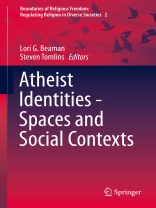The essays in this book not only examine the variety of atheist expression and experience in the Western context, they also explore how local, national and international settings may contribute to the shaping of atheist identities. By addressing identity at these different levels, the book explores how individuals construct their own atheist—or non-religious—identity, how they construct community and how identity factors into atheist interaction at the social or institutional levels. The book offers an interdisciplinary comparative approach to the analysis of issues relating to atheism, such as demography, community engagement, gender politics, stigmatism and legal action. It covers such themes as: secularization; the social context of atheism in various Western countries; the shifting of atheist identities based on different cultural and national contexts; the role of atheism in multicultural settings; how the framework of “reasonable accommodation” applies to atheism; interactions and relationships between atheism and religion and how atheism is represented for political and legal purposes. Featuring contributions by international scholars at the cutting edge of atheism studies, this volume offers unique insights into the relationship between atheism and identity. It will serve as a useful resource for academics, journalists, policy makers and general readers interested in secular and religious studies, identity construction and identity politics as well as atheism in general.
Tabella dei contenuti
Introduction, S. Tomlins and L. G. Beaman.- The Church on the Margins: The Religious Context of the New Atheism, W. A. Stahl.- Freedom of and Freedom from Religion: Atheist Involvement in Legal Cases, L.G. Beaman.- Atheism vs. Humanism: Ideological Tensions and Identity Dynamics, S. Le Drew.- The Cultural, the Nominal, and the Secular: The Social Reality of Religious Identity among Sri Lankan Tamil Youth in Canada, Amarasingam.- Secularist Rituals in the US: Solidarity and Legitimization, R. Cimino, C. Smith.- Believing to Belong: Non-religious Belief as a Path to Inclusion, S.C. Bullivant.- A Common Godlessness: A Snapshot of a Canadian University Atheist Club, Why its Members Joined, and What that Community Means to Them, S. Tomlins.- From Atheist to Spiritual but not Religious: A Punctuated Continuum of Identities among the Second Generation of post-1970 Immigrants in Canada, P. Beyer.- Living Non-religious Identity in London, L. Mumford.- Without God yet not Without Nuance:A Qualitative Study of Atheism and Non-religion among Scottish University Students, C.R. Cotter.- Who Are the “New Atheists”? R.T. Cragun.
Circa l’autore
Lori G. Beaman, Ph.D. is the Canada Research Chair in the Contextualization of Religion in a Diverse Canada and Professor in the Department of Classics and Religious Studies at the University of Ottawa. She is principal investigator of a 37 member international research team whose focus is religion and diversity (religionanddiversity.ca).
Steven Tomlins is a Ph.D. Candidate at the University of Ottawa in Religious Studies. His current research deals with atheist communities in a religiously diverse Canada, and how the frameworks (official and practical) of ‘multiculturalism’ relate to atheism. Besides atheism, Tomlins is also interested in religious diversity in Canada, and the intersection of blasphemy laws and freedom of expression in the West. His publications include: “A Snake in the Temple: Lucian of Samosata’s Alexander as a Challenge to the New Atheists’ Enlightenment Narrative” (Ottawa Journal of Religious Studies), “Oh, the Irony!?: Studying Atheism in Religious Studies” (Nonreligion and Secularity Research Network), and “The Freedom to Offend? How the ‘Mohammad Cartoon Controversy’ has Influenced Public Debate on Canada’s Hate Speech Regulation” (Journal of Church and State).







![Copertina di Brian Schrag & Julisa Rowe: Community Arts for God's Purposes [Chinese] 貼近神心意的社群藝術 Copertina di Brian Schrag & Julisa Rowe: Community Arts for God's Purposes [Chinese] 貼近神心意的社群藝術](https://static.worldofdigitals.com/thumb_webp/740/9781645083740.webp)




